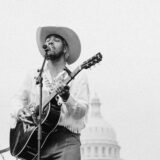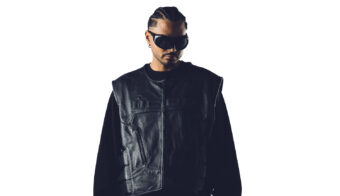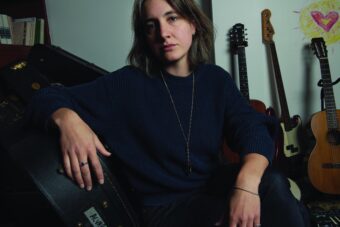Angel White doesn’t mind when country singers dress up as cowboys, even if they’ve never set foot on a ranch or hoisted themselves up into the saddle. “I think it’s flattering,” he says over Zoom. “The fact that they’re using these things without having done them—that doesn’t bother me. People can do whatever they want, and they choose this? Oh, you like this look and this lifestyle? That’s fine.”
A fifth-generation Texan, White was born and raised a cowboy, and the imagery of that way of life defines his sharp, poignant country songs. He grew up breaking horses on his family’s ranch outside of Fort Worth, and he still does that work when he’s not recording or touring. “My family have about seven horses out there, and then some land in Mexia. That’s where we have all of our wild horses—maybe 40 or 50. We’ll catch a couple, bring them up to Fort Worth, break them, sell them, and do it all over again. We live that life, and it just comes out in my music that way.”
Ghosts of the West Vol. 1, White’s debut album, is full of horses both wild and broken, lonely expanses of empty plains, cold nights under a blanket of stars, shootouts with lovers at high noon. It all coalesces into a dusty saddle opera, featuring his soulful Hill Country twang and beats that sound like the stomp of a hoof or the crack of thunder overhead.
While he doesn’t begrudge anyone playing the cowboy, White has seen his own history as a Black cowboy forgotten or, worse, erased from history books. “The Native cowboy, the Spanish cowboy, the Black cowboy… they’ve all been washed from things, but they’re the backbone of the West,” he says. “Those are the ghosts of the West. I’m all for lifting up the Black country artists. I’m clearly a Black artist, but this is me every day. This is not just me when I have a guitar in my hand.”
For White, the current discussion about the Black foundations of country music is exciting, as it is restoring the legacy of those who’ve been erased. But it does lead to some uncomfortable assumptions by white listeners. “I was in London a few months ago for the amazing C2C Festival, and I played a solo acoustic show. Somebody asked me, Are you doing this because of Beyoncé? Granted, this person didn’t listen to country music, and it makes sense that she would be their only association. But to hear that question really blew my mind, because I’ve been doing this for 10 years!”
White has been playing around Dallas-Fort Worth since the early 2010s when he cut his teeth busking for tourists and barcrawlers in Deep Ellum. It was a productive apprenticeship, teaching him not only to gauge his audience’s reactions to certain moments in his songs but also to devise his own sound. Country music, which spoke to his experiences growing up in rural Texas, was the foundation, but he added to the ideas he found in the music of Erykah Badu, Frank Ocean, and Bon Iver.
“I never learned any covers when I started playing guitar, because I wanted to find my own style of playing. I wanted to have my own signature. I just wanted to be undeniably myself, without anybody comparing me to anybody else. I’m influenced by so many things, but there are great ways to apply your influences without copying them.” Gradually, he made his way from the street corner to the stage (including a tour with Mod Sun) and into the studio (with Dwight Baker from the Wind & the Wave).
White recorded these songs in 2022 and gradually released one single at a time, letting each reveal a different aspect of his sound and songwriting: “Villain,” his debut, injects some gospel feeling into his trail song, while “Red Blanket” solemnly eulogizes his beloved grandmother. Sequenced together in Ghosts of the West Vol. 1, however, these songs become more than the sum of their parts: a feat of storytelling that echoes Willie Nelson and Robert Earl Keen. “I view the album as a ghost town, and every song is a different place in that town. I actually drew out a map when I was recording. I wanted it to be more than just music.I wanted it to be more than just music. I wanted it to be a whole world. As a kid, you build worlds in your head, and you can go anywhere you want. Music is a little like that for me.”





